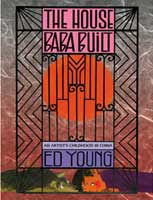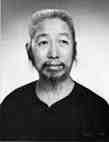Thursday, November 10, 2011
Cheng's Student Ed Young to Have Art Exhibit
In 1964, he happened to meet Professor Cheng Man-ch'ing, who was visiting the United States. After Cheng decided to stay on in New York City, Young became one of his assistants and translators, and became a taiji teacher himself in the New York area and beyond.
Young's book Lon Po Po, the Chinese Red Riding Hood story, won the Caldecott Medal, the highest US honor in children's book illustration. Two other books, The Emperor and the Kite, and Seven Blind Mice, by Young himself, have won Caldecott Honors. Recent books include Wabi Sabi (with Mark Reibstein), Moon Bear (with Brenda Guiberson), Hook, and Tsunami (with Kimiko Kajikawa). His newest book, The House Baba Built, a picture-book memoir about his boyhood in wartime Shanghai, is meeting with critical acclaim.
For an article about the exhibit, see the Abiline Recorder.
Young can be seen on this BBC video discussing The House Baba Built.
at
9:42 AM
![]()
Labels: art exhibit, cheng man-ch'ing, ed young, tai chi
Monday, July 4, 2011
Robert W. Smith, Student of Cheng Man-ch'ing
Smith met Cheng Man-ch'ing (Zheng Manqing) while posted as a CIA analyst to Taiwan in the late 1950s. He wrote about Cheng, whom he felt to be the most accomplished of all of his teachers:
"Zheng was unique, a happy aberration. He was able through tedious practice (much of it so arcane that it is a safe bet that it resides now in no living person) to take an intelligent and creative mind and to soften, reduce, and even empty it in the service of a none-too-robust boddy. From this synthesis came an absolutely unparalleled art of health and protection of health." (Martial Musings,p. 323)
Together, Smith and Cheng wrote T'ai Chi: The "Supreme Ultimate" Exercise for Health, Spoort, and Self-defense (Tuttle, 1967). This book presents taiji philosophy and Cheng's particular views, and the taiji form with detailed photos.
Smith's delightful memoir Martial Musings: A Portrayal of Martial Arts in the 20th Century (Via Media, 1999) is a mix of social, cultural, and personal history and commentary. Smith also featured Cheng in his book Chinese Boxing: Masters and Methods (Kodansha, 1974).
See further reports and links for Robert W. Smith on the Taijiquan Journal blog.
Monday, April 4, 2011
Cheng Man-ch'ing on Women's Health
 Cheng Man-ch'ing was, from the 1930s on, a practicing doctor of traditional Chinese medicine. He wrote several books on Chinese medicine topics related to women's health, cancer, and orthopedics, as well as newspaper columns on meditation and tai chi. His books on medicine discuss theory, application, cases, and prescriptions, and give insight into how Cheng thought about medicine.
Cheng Man-ch'ing was, from the 1930s on, a practicing doctor of traditional Chinese medicine. He wrote several books on Chinese medicine topics related to women's health, cancer, and orthopedics, as well as newspaper columns on meditation and tai chi. His books on medicine discuss theory, application, cases, and prescriptions, and give insight into how Cheng thought about medicine.
The complete Insights on Women's Medicine (女科心法Nu'ke xinfa) has just been released, translated by Douglas Wile, who also writes an extensive introduction to the work, giving the historical context of twentieth-century Chinese medicine and Cheng's place in it. The book is published by Sweet Ch'i Press (order through Redwing Books). Wile, formerly professor of Chinese at Brooklyn College, is a prolific translator, having previously translated and annotated several books: Thirteen Chapters, Cheng Man-ch'ing's Advanced Form Instruction, Zheng Manqing's Uncollected Writings, as well as Lost T'ai Chi Classics, T'ai Chi Touchstones: Yang Family Secrets, Tai Chi's Ancestors, and The Art of the Bedchamber: The Chinese Sexual Yoga Classics.
Friday, March 25, 2011
A Visit from West Point
 |
| Cheng giving a demonstration (source unidentified). |
As Tam Gibbs, Cheng's assistant and translator later recorded, "Mr. Kress demonstrated some Army field fighting techniques. All were helpless against him. Strong as a bear and as fierce as a tiger, he crouched in a stable posture, quick and light on his feet. Cooly concentrated and never initiating an attack, he took advantage of the slightest opening. Each of those to face him was sent staggering; no one could penetrate his long arms, which seemed like flagpoles with the hugest hands at the ends of them that I have ever seen on a man."
The tai chi students also gave demonstrations, and to everyone's delight, Kress and Cheng Indian wrestled. Cheng, a half-foot shorter and much lighter, bested Kress, but was worried, as he could sense Kress' high skill. The two men came away with a great appreciation of each other.
at
8:39 PM
![]()
Labels: martial arts, tai chi, west point, zheng manqing, 鄭曼青畫,



